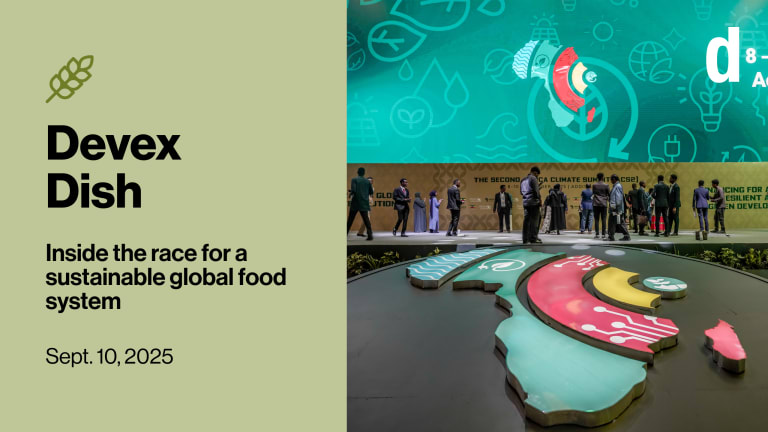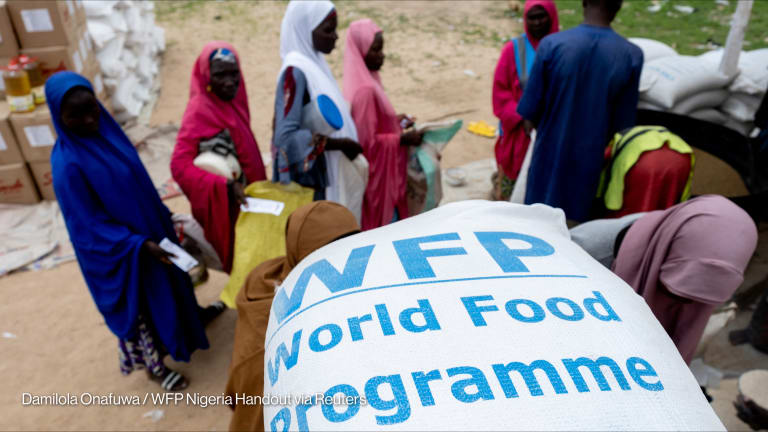Researchers unveil a way to monitor transformation of food systems
A new science-based monitoring architecture aims to bolster accountability, track progress, and guide policymaking on bringing about sustainable food systems in the lead-up to 2030.
It’s long been clear that if food systems will ever truly be transformed, policymakers will need data to guide their decisions and measure their impact. But there was never a comprehensive means for them to do that — until now. A group of food systems researchers and experts has developed a science-based monitoring architecture to assess food systems transformation worldwide. It emerged from discussions at the first United Nations Food Systems Summit in 2021, where among other things countries made commitments to create sustainable food systems. It’s also where the Food Systems Countdown to 2030 Initiative, or FSCI, was born. The initiative spent the past two years putting together that architecture — and last month they laid out their methodology in a peer-reviewed article in the journal Nature Food. They also published a first annual countdown report that paints a picture of the current state of national food systems and measures them against the new framework. The countdown report is meant to be a baseline against which to measure future progress. It found that both lower- and higher-income countries can learn from each other in various areas. And the monitoring system is aimed at bolstering accountability, tracking progress, and guiding policymaking for governments, businesses, and NGOs in the lead-up to 2030, the conclusion of the U.N. Sustainable Development Goals — and beyond. “If we don’t measure transformation then we don’t know if we are achieving transformation. It is as simple as that,” said Lawrence Haddad of the Global Alliance for Improved Nutrition, co-chair of FSCI. Other FSCI co-chairs are Jessica Fanzo, director of the Food for Humanity initiative at Columbia University Climate School; José Rosero Moncayo of the Food and Agriculture Organization, and Mario Herrero of Cornell University. Kate Schneider of the Johns Hopkins University School of Advanced International Studies leads FSCI’s data team and is the lead author of the Nature article, which included dozens of additional authors from CARE, the World Food Programme, the World Bank, and other universities. National governments are generally in agreement about the need to transform food systems for the good of people and the planet. Since the 2021 summit, at least 127 countries have developed “national pathways” for food system transformation, according to FAO, which tracks their policies and programs. FSCI has also rolled out a Food Systems Dashboard where anyone can view country-level data. The initiative plans to release new countdown reports annually through 2030, incorporating new indicators to fill any data gaps. Food systems transformation is vital to achieving the SDGs along with the Paris Climate Agreement. Agri-food systems can generate income, are vital to hunger and malnutrition reduction, and promote good health via healthy diets. But they also have a huge environmental footprint. “They also affect other SDGs related to climate, environment, labor, gender and education,” said Haddad. “Agri-food systems are also affected by climate change, urbanization and partnerships. So agri-food systems can be considered the arrowhead for the SDGs.” To devise a way to monitor food systems, FSCI members developed a new framework with five broad themes: Diets, nutrition, and health; environment, natural resources, and production; livelihoods, poverty, and equity; governance; and resilience. Themes were then split into 50 indicators, such as greenhouse gas emissions, crop yields, unemployment rate, availability of fruits and vegetables, sugar-sweetened drink consumption, total pesticides per unit of cropland, and more. Researchers used publicly available data, mostly from FAO, for 194 nations, or nearly all its member states. Some countries did not have data for all indicators. “If you look across all these indicators it’s not just high-income countries doing better on everything. No country or region of the world or category of country income level has a monopoly on what success looks like,” said Schneider. The research showed that low-income countries often did better on environmental indicators because their agriculture systems use fewer resources. At the same time, their agricultural output is less than that of their wealthy counterparts. The African continent has high rates of hunger and undernutrition. Meanwhile, European and North American diets are high in sugars, salt, and trans fats, which are risk factors for diabetes, obesity, and hypertension. Asia did well on environmental indicators and consuming fruits and vegetables, while Africa has a more diverse food supply. And according to the first annual countdown report: “Every country struggles with at least one form of malnutrition, from undernutrition to diet-related noncommunicable disease, and many countries suffer from more than one.” “It’s really important that the framework doesn’t just say Africa is doing worse on everything. There are a lot of reasons to highlight successes on that continent and also to know that low-income countries are doing some things that are better than high-income countries. There are opportunities to learn,” Schneider said. The research also found gaps in data for some indicators, a key takeaway for countries to focus on going forward. “Maybe someone imagined what an indicator should be, but there was no data,” Schneider said. There is not enough data at the country level around the world to determine levels of food loss and waste, for example. Data gaps were common around livelihoods, including determining who works in food systems and their welfare. Data around gender equity and violations of human rights in the food system workforce was also lacking. While the idea is to produce a new report each year through 2030, the data won’t necessarily be updated annually for every indicator. Rather, each year will highlight a new question or theme to help understand the relationships between and nuances in the data. Haddad said the next step is to take the countdown work to the country level. Publications for the next two years will look at country-level performance across indicators and themes. “Countries do not have to do the same thing in each context, they need to make the specific indicator set work best for their context,” he said.
It’s long been clear that if food systems will ever truly be transformed, policymakers will need data to guide their decisions and measure their impact. But there was never a comprehensive means for them to do that — until now.
A group of food systems researchers and experts has developed a science-based monitoring architecture to assess food systems transformation worldwide. It emerged from discussions at the first United Nations Food Systems Summit in 2021, where among other things countries made commitments to create sustainable food systems. It’s also where the Food Systems Countdown to 2030 Initiative, or FSCI, was born.
The initiative spent the past two years putting together that architecture — and last month they laid out their methodology in a peer-reviewed article in the journal Nature Food. They also published a first annual countdown report that paints a picture of the current state of national food systems and measures them against the new framework.
This story is forDevex Promembers
Unlock this story now with a 15-day free trial of Devex Pro.
With a Devex Pro subscription you'll get access to deeper analysis and exclusive insights from our reporters and analysts.
Start my free trialRequest a group subscription Printing articles to share with others is a breach of our terms and conditions and copyright policy. Please use the sharing options on the left side of the article. Devex Pro members may share up to 10 articles per month using the Pro share tool ( ).
Rebecca Holland is a reporter currently based in Louisiana. Her work has appeared in The Washington Post, The Guardian, The Independent, The Advocate/Times-Picayune, and more. She was a Pulitzer fellow in 2021 and has reported from dozens of countries. Previously, Rebecca was based in Iraq and Jordan.








